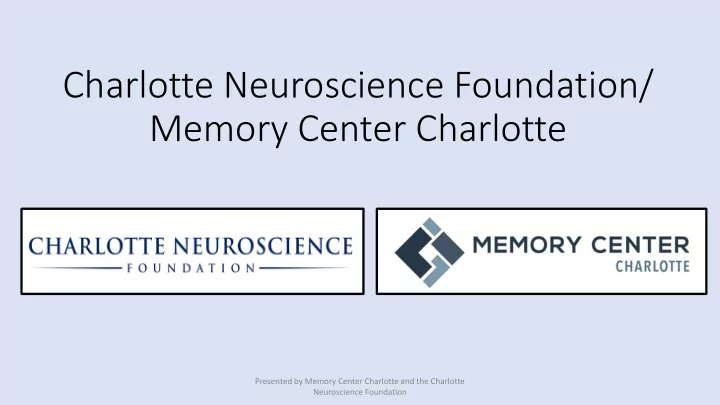

Charlotte Neuroscience Foundation/ Memory Center Charlotte Presented by Memory Center Charlotte and the Charlotte Neuroscience Foundation
The Applied Metaphysics Of f Aging and Cognitive Decline Dr. Charles H. Edwards II Medical Director Memory Center Charlotte Presented by Memory Center Charlotte and the Charlotte Neuroscience Foundation
Goals • 1) Introduce concept of normal cognitive aging • 2) How does it differ from abnormal cognitive decline? • 3)Review the definition and presentation of dementia • 4)Frontal Lobe Involvement/ Executive function deficits • 5)Lessons from the Memory Center on interaction with clients struggling with memory • 6) Elder Abuse Presented by Memory Center Charlotte and the Charlotte Neuroscience Foundation
Graph of f aging: Graph provided by agingstats.gov (Federal Interagency Forum on Aging-Related Statistics) Presented by Memory Center Charlotte and the Charlotte Neuroscience Foundation
Danielle Presented by Memory Center Charlotte and the Charlotte Neuroscience Foundation
Single Frame Danielle Presented by Memory Center Charlotte and the Charlotte Neuroscience Foundation
Physical decline: times in different distances From Timothy Salthouse’s “Major Issues in Cognitive Aging” Presented by Memory Center Charlotte and the Charlotte Neuroscience Foundation
From Timothy Salthouse’s “Major Issues in Cognitive Aging” Presented by Memory Center Charlotte and the Charlotte Neuroscience Foundation
From Timothy Salthouse’s “Major Issues in Cognitive Aging” Presented by Memory Center Charlotte and the Charlotte Neuroscience Foundation
Lobes of f the brain Presented by Memory Center Charlotte and the Charlotte Neuroscience Foundation
Function of f Four Lobes Presented by Memory Center Charlotte and the Charlotte Neuroscience Foundation
How the Brain works Reading, hearing, thinking about words, and saying words Presented by Memory Center Charlotte and the Charlotte Neuroscience Foundation
Normal l Agin ing : Are Old lder Brain ins Wis iser? • “Remembering what to remember and what to forget” • Processing time is measurably slower • May misplace things at times • May forget names on occasion • Experiences more difficulty with multi-tasking • May have difficulty remembering details • Most recently learned knowledge subject to age related decline • Annoying but not disabling Albert Einstein, 1875-1955 Presented by Memory Center Charlotte and the Charlotte Neuroscience Foundation
Risk Factors for Memory ry Loss • Age • Genetics and family history • Head trauma • Medications • Loneliness • Vascular Risk Factors • Medical Illness: Hypertension, stroke, heart disease, diabetes, obesity, tobacco, cholesterol, sleep apnea/deprivation • Environmental factors: Diet, lack of exercise, excessive alcohol use, chronic stress • Lower Education Level • Possibly poor nutrition, more toxic exposures, less health care, or less cognitive reserve Presented by Memory Center Charlotte and the Charlotte Neuroscience Foundation
Mild Cognitive Im Impairment ( ( MCI ) • Affects 10-20% of those 65 years old • Decline from previous function, BUT able to perform most daily activities • Compensatory ability • Some with MCI stay the same, some improve, and some decline Presented by Memory Center Charlotte and the Charlotte Neuroscience Foundation
Presented by Memory Center Charlotte and the Charlotte Neuroscience Foundation
Why is the diagnosis oft ften delayed? Presented by Memory Center Charlotte and the Charlotte Neuroscience Foundation
Neanderthal / Modern skulls Presented by Memory Center Charlotte and the Charlotte Neuroscience Foundation
Frontal Lobe / Executive Function • Site of: • Civilized behavior/ manners • Insight and Judgement • Focus/ Plan/Consequences • Deficits: • Easily distracted/impulsive • Abnormal relationship with risk • Obsessions Presented by Memory Center Charlotte and the Charlotte Neuroscience Foundation
Presented by Memory Center Charlotte and the Charlotte Neuroscience Foundation
Lessons From Memory ry Center I • Never rush/smile • Introduction/ Purpose of the meeting • Soft, calm voice/ calm atmosphere • Speak directly to client • Respect titles • Allow client to speak • Simple, Direct instructions • Written summary Presented by Memory Center Charlotte and the Charlotte Neuroscience Foundation
Lessons fr from the Memory ry Center II II • Medical issues • Hearing • Expressive aphasia: Patient will appear more impaired than they are • Receptive aphasia: simple, single points. • Semantic aphasia: simple concise language Presented by Memory Center Charlotte and the Charlotte Neuroscience Foundation
Lessons fr from Memory Center II III: Ribot’s Law: first memories in are last memories out Presented by Memory Center Charlotte and the Charlotte Neuroscience Foundation
Lessons fr from Memory Center IV IV: Presented by Memory Center Charlotte and the Charlotte Neuroscience Foundation
Elder Abuse • 1) physical abuse • 2) psychological or verbal • 3) sexual • 4) financial • 5) neglect: both self and inflicted. Presented by Memory Center Charlotte and the Charlotte Neuroscience Foundation
Summary ry • Knowledge and compassion together can make us more effective in dealing with this growing demographic of our population. • Gratitude, not pity is the proper emotion. Presented by Memory Center Charlotte and the Charlotte Neuroscience Foundation
Recommend
More recommend